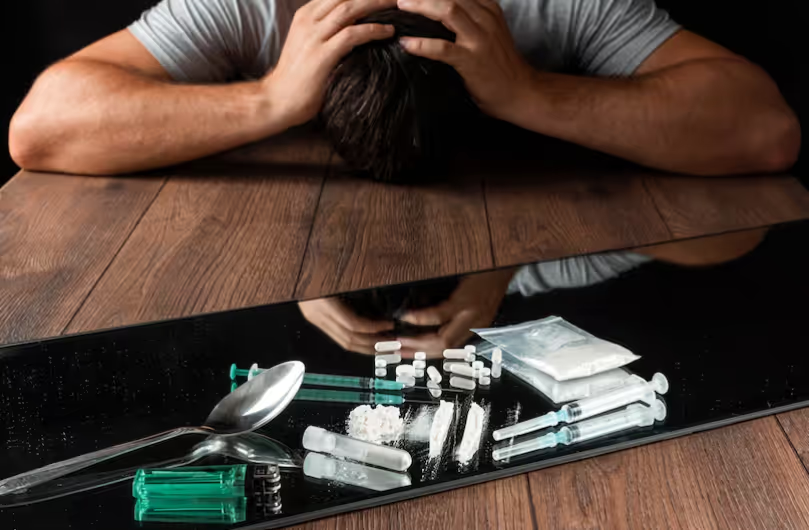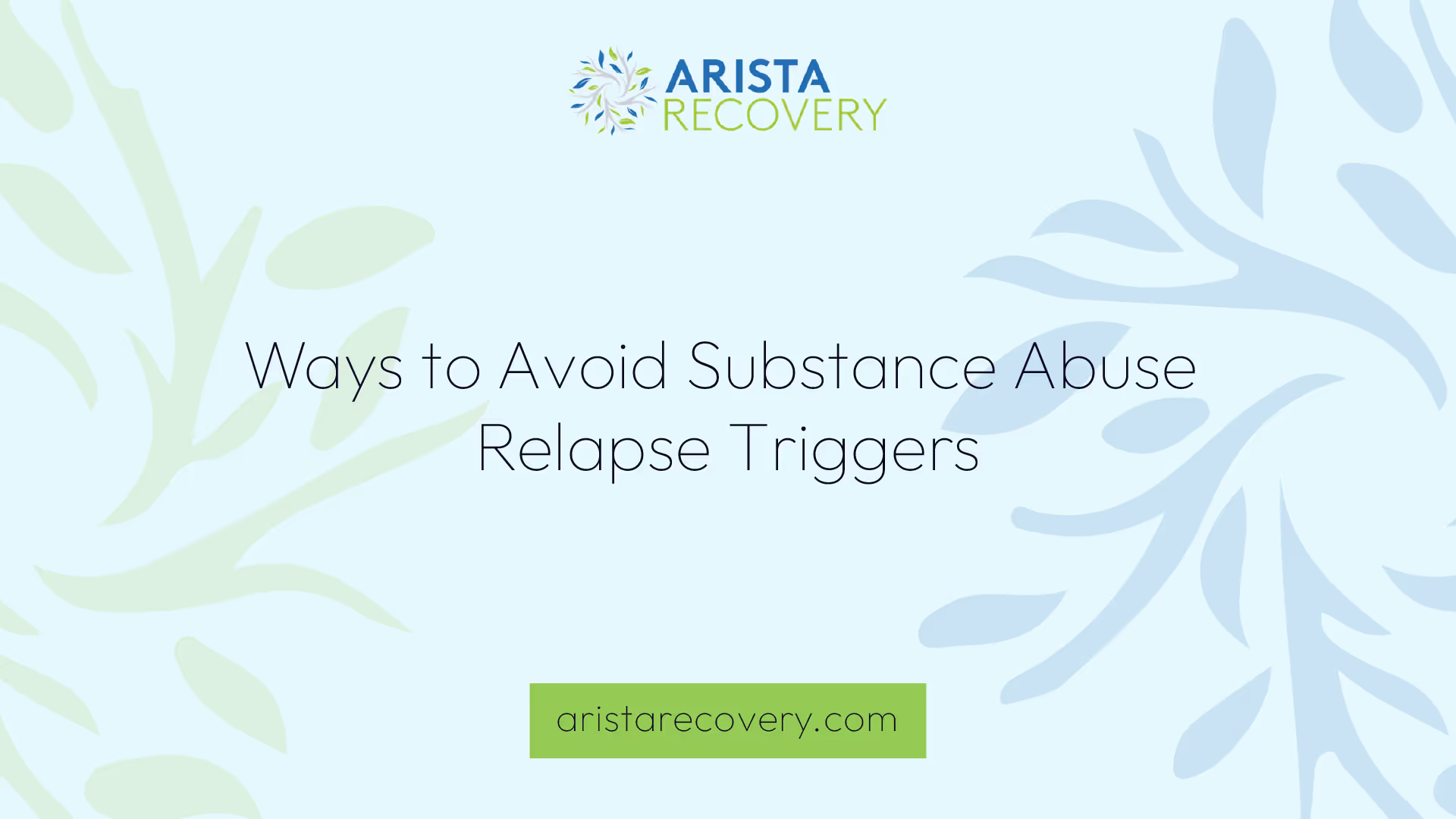
Ways to Avoid Substance Abuse Relapse Triggers
Understanding Relapse Triggers
In the journey towards recovery from substance abuse, understanding relapse triggers is a critical step. It provides a solid foundation for developing strategies to avoid substance abuse relapse triggers, thereby aiding in successful sobriety.

Common Relapse Triggers
Relapse triggers are various factors or situations that can prompt an individual in recovery to return to substance use. According to the National Institute on Drug Abuse (NIDA), between 40-60% of recovering addicts will experience relapse.
Common relapse triggers often fit into the acronym HALT, which stands for Hungry, Angry, Lonely, Tired. This acronym is used extensively in the field of chemical dependency counseling to describe situations that may be deemed high-risk for those in recovery.
Moreover, physical illness and mental disorders can also contribute to the risk of relapse. It's essential for those in recovery to notify their doctors and seek non-addictive treatment options to maintain their recovery.
Impact of Stress on Relapse
Stress plays a significant role in substance abuse relapse. It can be the root cause of relapse and should always be seen as a potential danger to recovery. Managing stress is crucial for successful sobriety, particularly for those in the early stages of recovery [1].
Stress can stem from multiple sources, including personal relationships, work, financial difficulties, or significant life changes. It can lead to feelings of discomfort, tension, or unease, which a person might attempt to alleviate through substance use. Therefore, learning effective stress management techniques is a key aspect of maintaining sobriety and preventing relapse.
The risk of relapse can also be exacerbated by social isolation, leading to a sense of loneliness and rationalizations to use substances again. Building a strong and supportive network of people is crucial for maintaining recovery [1].
By understanding and recognizing these common relapse triggers, individuals in recovery can work towards developing effective strategies to manage them. This understanding is a key step in the journey towards lasting recovery.
Psychological Factors in Relapse
Understanding the psychological factors that contribute to relapse can help in creating effective strategies for avoiding substance abuse triggers.
Role of Coping Skills
Coping skills are critical in preventing relapse. Effective coping strategies, such as behavioral or cognitive strategies, can help individuals manage high-risk situations and reduce the likelihood of relapse. This includes positive self-talk or leaving the situation when confronted with a trigger. Thus, developing and refining these coping skills can be a crucial part of a person's journey towards sustained recovery.
Influence of Self-Efficacy
Self-efficacy, or the degree to which an individual feels confident and capable of performing certain behaviors in a specific situational context, is another crucial psychological factor in relapse prevention. Higher levels of self-efficacy have been associated with longer intervals of relapse to substance use [3]. This implies that fostering confidence and belief in one's ability to avoid relapse can significantly impact the recovery process.
Importance of Outcome Expectancies
Outcome expectancies, or an individual's anticipation or belief of the effects of a behavior on future experience, also play a significant role in relapse. Negative expectancies, or beliefs that the consequences of relapse will be harmful or undesirable, are protective against relapse. On the other hand, positive expectancies, or beliefs that substance use will have beneficial effects, are a risk factor for relapse.
Research has shown, for instance, that individuals who drink heavily tend to have higher expectations regarding the positive effects of alcohol and may anticipate only the immediate positive effects while ignoring the potential negative consequences of excessive drinking. Therefore, managing such expectations can be a key component of relapse prevention strategies.
In conclusion, coping skills, self-efficacy, and outcome expectancies play significant roles in relapse and recovery. Understanding these psychological factors can provide beneficial insights into effective ways to avoid substance abuse relapse triggers.
Social Support and Relapse Prevention
Overcoming addiction is a challenging journey, with the potential for relapse always lurking. As such, having a strong social support system becomes crucial in maintaining sobriety and avoiding substance abuse relapse triggers. This journey includes building a reliable support system and fostering positive social networks.
Building a Support System
Recovery from addiction requires commitment, dedication, and a robust support system. The belief is that everyone should have the opportunity to lead a fulfilling life free from addiction.
A strong support system is essential for relapse prevention in addiction recovery. This underscores the significance of support and accountability for individuals grappling with addiction. Organizations such as GOFAN Healthcare Services LLC provide person-centered psychiatric care programs that prioritize support and accountability. These programs offer mental health services tailored to address each client's unique needs for achieving and maintaining sobriety.
Positive Social Networks
Besides having a solid support system in place, fostering positive social networks can significantly enhance relapse prevention outcomes. As per the research, positive social support is highly predictive of long-term abstinence rates.
Positive social networks can include friends, family, community groups, recovery groups, online support forums, and mental health professionals. These networks provide emotional support, practical assistance, and positive reinforcement, crucial for individuals navigating the path to recovery.
Engaging with positive social networks can help individuals in recovery to manage stress, develop healthy coping mechanisms, and stay motivated to maintain their sobriety. They provide a sense of belonging and acceptance, which can be critical in times of crisis or potential relapse.
In conclusion, building a reliable support system and fostering positive social networks are two key strategies in avoiding substance abuse relapse triggers. These social connections provide the support, encouragement, and accountability necessary for long-term recovery success.
Internal vs. External Triggers
Understanding and managing triggers are key aspects of successful recovery from substance abuse. Triggers can be both internal and external and recognizing these can help individuals avoid situations that might lead to a relapse.
Identifying Addiction Triggers
Addiction triggers can be broadly classified into internal and external categories. Internal triggers are typically related to emotions such as anger, fear, sadness, or boredom. External triggers, on the other hand, are related to people, places, and things associated with past drug or alcohol use [5].
Further, triggers can be environmental, emotional, behavioral, and psychological. Environmental triggers can include people, places, or things that remind one of past substance use. Emotional triggers can involve feelings of stress, anxiety, depression, while behavioral triggers can be associated with certain activities, habits, and routines. Psychological triggers often stem from negative thoughts and beliefs.
Recognizing these triggers is a crucial step in managing and avoiding relapse.
Managing Emotional Triggers
Emotional triggers such as stress, anxiety, depression, anger, sadness, loneliness, and boredom can be particularly challenging to manage. However, there are several strategies that can be effective in this regard.
Practicing self-care is vital. This can involve eating a balanced diet, getting regular exercise, ensuring adequate sleep, and taking time each day to relax and do something enjoyable. Engaging in healthy activities like exercise, meditation, or reading can help reduce negative emotions and stress that could lead to substance use.
Building a strong support system is also important. This can involve maintaining close relationships with supportive friends and family, attending support group meetings, or seeking professional help. Regular therapy sessions can help individuals develop coping skills for managing emotional triggers.
Creating a new routine that does not involve activities associated with substance use and setting healthy boundaries with individuals who still use drugs or alcohol can also help manage and avoid these triggers [5].
By identifying and effectively managing these triggers, individuals can significantly reduce the risk of a relapse and progress more smoothly on their recovery journey.
Behavioral Triggers and Relapse
Behavioral triggers are a significant aspect of substance abuse relapse that often go overlooked. Recognizing these patterns and establishing healthy routines is key to avoiding substance abuse relapse triggers and maintaining long-term recovery.
Recognizing Behavioral Patterns
Behavioral addiction triggers involve specific activities, habits, and routines that are associated with substance use. According to Experience Recovery, these can include actions such as visiting a bar or club, engaging with drug-related content online, or having unstructured free time.
It's important to be aware that addiction triggers can also be environmental, emotional, or psychological, including everything from people and places to stress, anxiety, and negative thoughts. Being able to identify these triggers is a critical step in managing and avoiding substance abuse relapse.
Creating Healthy Routines
Creating new and healthy routines is an effective way to avoid behavioral addiction triggers. Replacing old habits and behaviors associated with substance use with new, positive activities can significantly reduce the risk of relapse.
For instance, if going to a bar after work is a trigger, it could be replaced with going to a gym or attending a support group meeting. If unstructured free time is a trigger, filling it with a structured activity like reading, practicing a hobby, or volunteering can be helpful.
Additionally, Experience Recovery suggests setting healthy boundaries with individuals who still use drugs or alcohol as well as limiting contact with places associated with substance abuse.
By recognizing behavioral patterns and establishing healthy routines, individuals can successfully navigate their journey to recovery and successfully mitigate ways to avoid substance abuse relapse triggers.
Relapse Prevention Strategies
Navigating the journey of recovery from substance abuse often involves the challenge of avoiding relapse triggers. Effective relapse prevention strategies can significantly help individuals maintain their sobriety. These strategies include developing coping techniques and seeking professional help.
Coping Techniques
Coping skills are critical in preventing relapse. Effective coping strategies, such as behavioral or cognitive strategies, can help individuals manage high-risk situations and reduce the likelihood of relapse. Some effective coping techniques include:
- Relaxation Techniques: Grounding and other relaxation techniques can help individuals feel less overwhelmed and calm down, reducing the risk of relapse. These techniques are particularly helpful for those triggered by intrusive traumatic memories.
- Taking a Breath: Pausing to take a breath and waiting to respond when feeling angry, irritable, or triggered can prevent interpersonal issues. This coping skill can help individuals in recovery react to situations with a more logical and less emotional approach.
- Playing the Tape Through: This technique, often taught in cognitive behavioural therapy (CBT), encourages individuals to remember their motivation for getting sober when experiencing cravings. It involves visualizing the potential negative consequences of relapsing, which can help the craving pass [6].
- Honesty: Being truthful about addiction with oneself and others is important for building trust, mending broken relationships, and recognizing the potential for relapse. Honesty can help individuals confront their challenges and seek the necessary support [6].
Seeking Professional Help
Professional help can play a significant role in preventing substance abuse relapse. Therapists, counselors, and support groups can provide the necessary guidance and emotional support during the recovery journey. They can help individuals develop effective coping strategies, deal with stress, and improve their mental and emotional well-being.
Professional help can also provide a safe space for individuals to share their experiences, challenges, and successes. This can inspire and motivate individuals in their journey to sobriety. Furthermore, professionals can provide personalized treatment plans, monitor progress, and adjust strategies as needed.
In conclusion, navigating the path to recovery from substance abuse involves effective relapse prevention strategies. By developing coping techniques and seeking professional help, individuals can successfully manage and avoid substance abuse relapse triggers.
References
[1]: https://freebythesea.com/relapse-prevention/
[3]: https://www.ncbi.nlm.nih.gov/pmc/articles/PMC5844157/
[4]: https://www.gofanhcs.com/importance-of-support-in-relapse-prevention
[5]: https://www.experiencerecovery.com/blog/identifying-addiction-triggers/
[6]: https://www.simcoerehab.ca/2024/01/05/coping-skills-for-addiction/
When mental health challenges and addiction intersect, it can feel isolating. At Arista, we offer compassionate, evidence-based, and trauma-informed care to help you heal, grow, and move forward.
You’re not alone in this.
When mental health challenges and addiction intersect, it can feel isolating. At Arista, we offer compassionate, evidence-based, and trauma-informed care to help you heal, grow, and move forward.
Support that moves with you.
You’ve taken a brave first step. At Arista Recovery, we’re here to help you continue with best-in-class care designed for long-term healing and support.
.webp)






